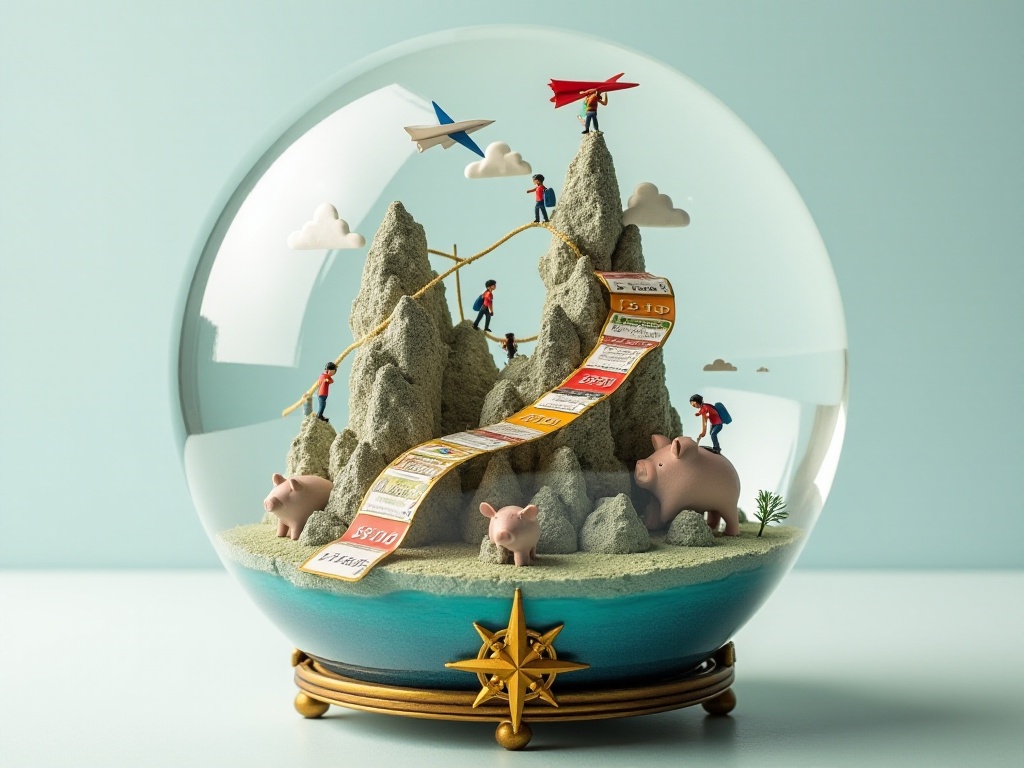Introduction
I'm so envious of those people who post amazing travel photos on social media! Every time I see them, I want to book a ticket right away, but then I look at my wallet and quietly retreat. However, as someone who used to spend their entire monthly salary as soon as it arrived, I can now somehow travel the world through careful budgeting, which honestly amazes even me. Today I'll share my journey and tell you how I transformed from a financially struggling office worker into a savvy travel budget expert.
Complete Budget Breakdown
When it comes to travel budgeting, it's really quite a deep rabbit hole. When I first started budgeting, I thought it was just about airfare and hotels. But when I actually listed everything out, it was truly eye-opening!
Let's start with transportation costs - this is truly a bottomless pit. Airfare alone isn't enough; just getting from home to the airport can be quite costly. Friends in Beijing and Shanghai have it easier, with airport express trains costing just over a hundred yuan round trip. But for those of us living in the suburbs, a taxi to the airport easily costs 200 yuan or more. Plus, ride-hailing apps have gotten smart - prices immediately jump up for airport-bound rides.
At your destination, expenses keep piling up. While subway and bus fares are cheap, sometimes you have to take a taxi when you're in a hurry. Take my recent experience in Tokyo - I planned to save money by taking the subway, but didn't expect the last train to be so early. I had to reluctantly take a taxi, spending the equivalent of three ramen meals in one go.
Accommodation costs are another interesting story. Hotels, hostels, and vacation rentals each have their own considerations, making choices really challenging. Luxury hotels are comfortable but their thousand-yuan-per-night rates can quickly empty your wallet. Hostels are cheap, but sharing a room with a snoring roommate can make days feel like years. As for vacation rentals, mid-range prices but reliability depends entirely on luck.
I now particularly enjoy staying in capsule hotels, especially in Japan. I was worried the first time, fearing I'd feel claustrophobic while sleeping. But in practice, I found the space adequate, facilities comprehensive, and prices very reasonable. Plus, capsule hotels are usually in convenient locations, so the money saved on accommodation can go toward taxis or souvenirs.

Smart Planning Methods
After understanding where the money goes, the next step is finding ways to save. The 2025 travel market is increasingly competitive, but this means more choices for us consumers.
Booking flights has become quite technical. While everyone knows about platforms like Qunar and Ctrip, their prices aren't necessarily the lowest. I now compare multiple platforms, sometimes finding price differences of over a thousand yuan. Especially for international routes, booking departure and return flights separately can often save significant money.
Many airlines now offer membership programs, making points redemption for flights or upgrades very worthwhile. I used points accumulated from business trips to fly to Sanya for free last year. Airlines within alliances can now share points, so points won't go to waste even with airlines you rarely use.

Implementation Strategies
The best plans are worthless without execution. I now use an Excel template specifically for tracking travel expenses. Every expenditure is recorded, including amount, time, category, and notes. This helps monitor budget execution in real-time and reveals spending patterns when reviewing data later.
During my Kansai trip last year, I wrote each day's budget in advance in my notes. Though it felt cumbersome at first, I gradually got used to it. Every time I record expenses, I unconsciously evaluate whether the money was well spent. For instance, if a 500-yuan meal turns out mediocre, I'll consider different options next time.

Practical Experience
Let's get to some practical examples. Last year, I completed a two-week trip to Japan's Kansai region using this method, keeping total expenses under 12,000 yuan. This included all costs for flights, accommodation, meals, transportation, and attraction tickets.
First, regarding flights, traveling during off-season meant round-trip tickets only cost 2,800 yuan, nearly 2,000 yuan cheaper than peak season. For accommodation, I chose centrally located hostels - while they were shared rooms, the overall environment was good, and I met many interesting fellow travelers. Seven nights of accommodation totaled 1,400 yuan, averaging 200 yuan per night.

Final Thoughts
Ultimately, budget travel isn't about saving money - it's about getting value for every penny spent. As I often say: careful budgeting isn't about limiting travel, it's about being able to go further.
To start planning your travel budget, begin by tracking daily expenses. Understanding your spending habits helps create the most suitable travel budget. For instance, if you're used to nice hotels, don't force yourself to stay in hostels - it might affect your mood. Conversely, if you're accustomed to simple living, don't feel pressured to seek luxury.
Most importantly, remember that travel's value isn't measured by how much you spend, but by how many unforgettable experiences you gain. Sometimes the best memories come from unexpected little surprises rather than deliberately sought-after luxury experiences.
So rather than envying others' travel lives, start planning your own journey now. With careful planning and dedicated execution, anyone can become a travel expert!


